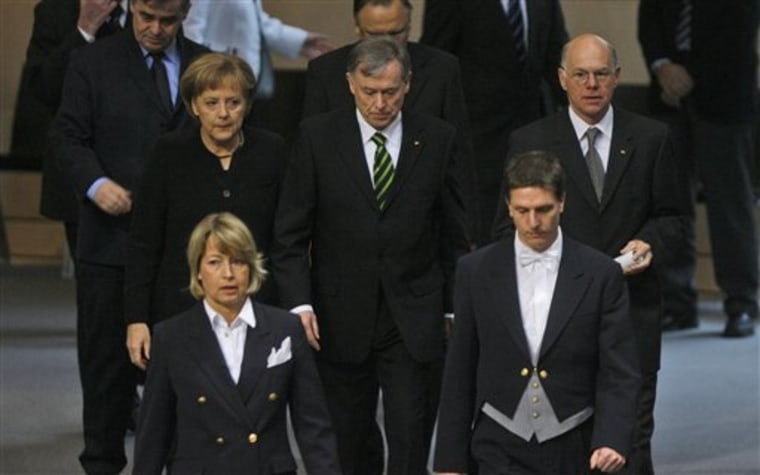Germany's parliament on Thursday remembered the Nazis' swift destruction of democracy after Adolf Hitler took power 75 years ago, and paid tribute to lawmakers who held out against the Nazis' drive to extinguish political opposition.
Chancellor Angela Merkel and President Horst Koehler attended a solemn hour-long session in Berlin's restored Reichstag building. The burning of the Reichstag in early 1933 was one of the events that let Hitler consolidate his grip on power.
"We bow today before all the victims of the National Socialist dictatorship," Parliament President Norbert Lammert said in a speech to lawmakers.
Hitler convinced ailing President Paul von Hindenburg to appoint him chancellor on Jan. 30, 1933.
"No one should have had any illusions about how things would be in future," Lammert said. "Adolf Hitler had never left any doubt as to what he would do with power if he were only to get it."
By the time the Nazis staged book burnings on May 10, "the new regime had in a few weeks, after a legal change of government, worked its way through almost everything that would set the tone for the next 12 years: breaking the law, breaking the constitution, breaking with civilization," Lammert said.
A month after Hitler took power, he used the torching of the Reichstag — blamed on a Dutch communist — to strengthen his grip on power, suspending civil liberties and cracking down on opposition parties in paving the way for the police state.
On March 23, parliament approved the Enabling Act, "enabling" Hitler's Cabinet to issue decrees without approval by lawmakers or the president and effectively giving him dictatorial powers.
'Silent heroes of democracy'
The lawmakers heard what Lammert called "the last truly free words in the German Reichstag" — extracts of a speech in which Social Democratic parliamentary leader Otto Wels opposed the act, declaring that "they can take away our freedom and life — not our honor."
The Enabling Act won the approval of 444 lawmakers. Communist lawmakers and some Social Democrats already were excluded, and only the remaining 94 from Wels' party voted against.
"They refused to give the violent overthrow (of democracy) the badge of legality," Lammert said. "With that, they — most of them then as now unknown to a wide public — became silent heroes of democracy and parliamentarism."
Hans-Jochen Vogel, a former justice minister and Social Democratic leader, pointed to the lessons for the future, at a time when Germany has worried about the success of fringe far-right parties in entering some of its state parliaments.
"Those who look away and just shrug their shoulders weaken democracy; those who speak up strengthen it," Vogel, 82, told lawmakers to applause.
"Never again: that should be the decisive motto for today," Vogel said. "We must not delude ourselves: back then, more and more Germans cheered him (Hitler), saw him as a savior," Vogel said.
